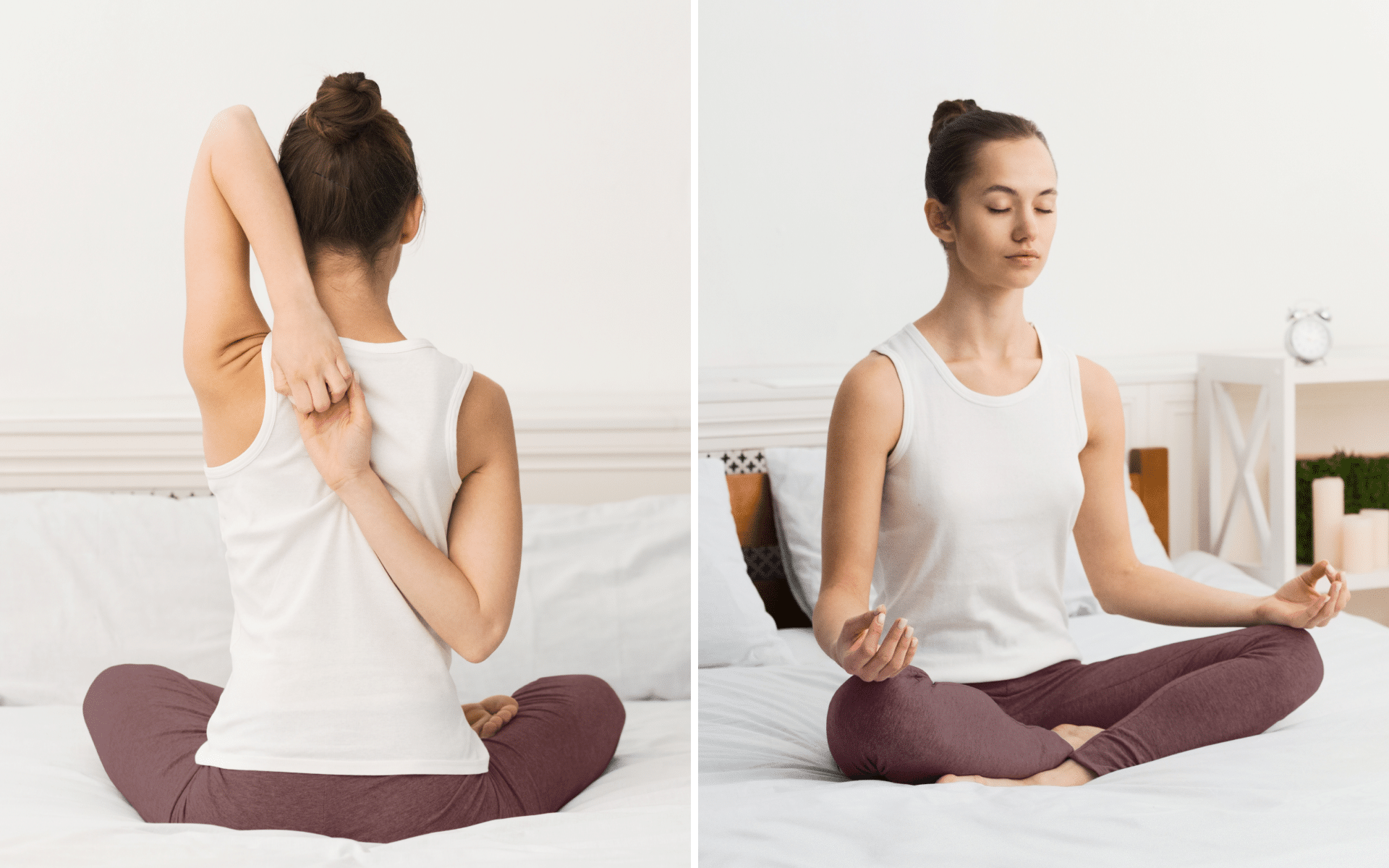Do you like sleeping? It’s hard to find a person who doesn’t enjoy a nice deep sleep. You lie on your bed covered with freshly cleaned bedding, breathe in the relaxing aroma, close your eyes, and drift off.
But this process is not so pleasurable for everyone. There are internal and external stressors and responsibilities that can deprive us of good sleep. Some may work night shifts, others may stay awake because their baby is crying the entire night, and others may simply be obsessed with scrolling through compelling videos on the Internet.
So instead of 7 or 8 hours, you may sleep only 4 or 6 hours a day. More commonly, people wake up during the night to go to the bathroom, have a glass of water, or are simply sweaty from the hot summer days. This impairs the quality of sleep and the next day, you’re too weary for even regular activities.
But what if you can’t help but sleep for only 4 hours per day? Your job may take too much time or other stressors deprive you of the optimal time for sleep. Read this article to unravel whether 4 hours of sleep per day is healthy for your body and mind. Here’s what science says.
BetterMe is your fast-track ticket to a long-lasting weight loss! Tailor your fitness journey and maximize your results with just a couple of swipes!
Can you survive with 4 hours of sleep?
Think about the last time you slept for just 4 hours. For some people, it may be enough. They still feel invigorated enough and ready to commit to their daily tasks. This means you can survive with 4 hours of sleep every day. But the question is, is it healthy?
The National Sleep Foundation provides the following recommendations for the appropriate amount of sleep every day (3):
- Newborns (0–3 months): 14–17 hours
- Infants (4–11 months): 12–16 hours
- Toddlers (1–2 years): 11–14 hours
- Preschool (3–5 years): 10–13 hours
- School-age kids (6–12 years): 9–12 hours
- Teenagers (13–18 years): 8–10 hours
- Young adults (18–25 years): 7–9 hours
- Adults (26–64 years): 7–9 hours
- Older adults (65 years and above): 7–8 hours
Sleeping less may be detrimental to your health and mental performance. You can try it for a few days, but you’ll gradually notice the negative effects of it.
What happens if I sleep 4 hours?
You need healthy sleep in order to function well. However, sometimes you lack good sleep. No matter whether you’re sleeping for 4 hours per night intentionally or unintentionally, you’ll experience several negative effects:
- Mood swings
- Feelings of irritability for no reason
- Problems with focusing and remembering
- Fatigue
- Reduced sex drive (10)
This is just the tip of the iceberg as sleep deprivation leads to changes in your body:
- The immune system. You’ll become more prone to infections, which may take longer to resolve, and respiratory diseases (12).
- Weight. Surprisingly, you can gain weight during impaired sleep. Here’s how it works: bad sleep affects the hormones that are responsible for feelings of hunger and fullness. It also triggers the release of insulin. Your lack of optimal sleep range can cause increased fat storage, body weight changes, and a higher risk of type 2 diabetes.
- The cardiovascular system. Healthy sleep plays a crucial role in the healing and rebuilding of heart vessels that help maintain blood pressure, sugar levels, and inflammation control. If you sleep only 4 hours or less you elevate your risk of cardiovascular disease.
- Hormone levels. Your hormone production can change due to insufficient sleep. This includes the production of growth hormones and testosterone. In addition, your body releases additional stress hormones, such as cortisol and norepinephrine.
- The brain. You sleep less, impairing your prefrontal cortex, which handles reasoning, and the amygdala, which deals with emotion. In addition, it may be more difficult for you to form new memories, which affects learning.
- Fertility. Insufficient sleep may affect the production of hormones that promote fertility (19).
Is 3 to 4 hours of sleep OK?
It is not okay to sleep only 3 to 4 hours. From the previous segment, you’ve learned about the optimal time ranges of sleep for different people.
Doing it for a short period is one thing, but practicing short sleep all your life can put you at risk of serious health conditions such as:
- Heart disease
- Diabetes
- Kidney disease
- Depression (17)
You also need to recognize the difference between sleep deprivation and insomnia. The former means you can’t fall asleep no matter how hard you try while sleep deprivation entails consciously not finding time for good sleep.
Therefore, choosing to sleep for only 3 to 4 hours intentionally will impact the quality of your life. You won’t only feel tired, you could also end up with serious health conditions in the future. You need to analyze the main reasons why you sleep so little.
Some daily habits or lifestyle activities can impair your sleep. Making some changes can help with this, but if you regularly have difficulty sleeping, you should contact a healthcare provider for guidance.
Read more: 20 Benefits of Sleeping Naked for the Nudist Enthusiast to Enjoy Better Health, Sex, and More
How much sleep is too little?
Do you want to get the most out of good sleep? Then you need to sleep the appropriate number of hours. The optimal time is 7 to 9 hours in adults, but in terms of what is too little sleep, there is one simple answer – anything less than 7 hours of sleep is detrimental.
Getting less than 7 hours of sleep can lead to poor health, including high blood pressure, diabetes, depression, heart disease, stroke, and weight gain (2).
If you sleep too little from time to time, there’s no need to worry, as we all know how unpredictable life may be. However, a constant lack of sufficient sleep is negative for your health and mental abilities.
Is it healthy to sleep 4 to 5 hours?
The short answer is no. Sleeping for 4 to 5 hours is not healthy. Some people claim 4-5 or 6 hours is enough for them, but they’re wrong. Here’s the reality: if you sleep for 4 to 5 hours daily, you gradually get used to the negative effects of sleep.
Training your body to sleep less is not a good option as your body needs more sleep than 5 hours. You may think that you’re adapting to being awake more, but in fact, you’re performing daily activities at a lower level.
Therefore, having 4 hours of sleep a night for a month, year, etc. is not healthy. Try to sleep for an adequate amount of hours that is compatible with your age.
Is it okay to sleep 4 hours twice a day?
Most people sleep in the same way – they collapse into bed, close their eyes, and if they’re lucky, remain that way for at least 7 hours every night. However, some people break up the slumber into two shifts.
This is called segmented sleep. It involves going to sleep at night, then waking up after a few hours, and going to bed again for a couple of hours during the day. It works well for some people to sleep for 4 hours twice a day.
However, there are mixed perspectives regarding this sleeping activity. Even though there hasn’t been much research on whether sleeping shifts are healthy or not, you should avoid this routine unless there is a valid reason for you to do so.
Of course, if you naturally sleep this way and feel okay with it, you can continue with this procedure. Doing it on purpose and waking up in the middle of the night can impact your circadian rhythms – the internal clock that controls processes in your body (18).
What are the phases of sleep?
The science of sleeping stages is engaging. Interestingly, if you neglect one of the phases, you’re more likely to feel like a squeezed lemon the next day. Check out the main 4 sleeping cycles that you hopefully experience every night:
- Stage 1 non-REM: This stage is the lightest as it takes around 1 to 5 minutes. Your breathing, heart rate, and brain waves start to slow down and your muscles relax.
- Stage 2 non-REM: This stage lasts for 30 to 60 minutes. It occurs before the body enters deep sleep. Your muscles relax more and your temperature drops.
- Stage 3 non-REM: You’re in the stage of deep sleep that lasts 20 to 40 minutes. Your breathing and heart rate slow to their lowest levels.
- REM (Rapid eye movement) sleep: Within 90 minutes of falling asleep, you enter REM sleep. Your brain becomes more active, most dreaming occurs, and your arms and legs are temporarily paralyzed (7).
Your body needs to move through all these cycles several times each night. If you have a full sleep, you generally move around four to six times in all 4 cycles. But with only 4 hours of sleep, you’ll only cycle through these stages twice.
What are 6 tips for better sleep?
You now have all the knowledge about optimal time sleep ranges and you’re ready for the changes. The good news is that there are healthy and simple ways to promote better sleep and also make your well-being more satisfactory. In simple terms, you look better, feel better, and perform better.
Here are the top 6 tips for better sleep that you should implement today (14):
- Create a sleeping schedule for yourself. This means you turn in and wake up at the same time every day. Please note that weekends also count. People often neglect this rule on Saturdays or Sundays, excusing themselves with “Well, I can sleep longer, or deserve this all-night party”. Sufficient sleep is your door to a happier life, so don’t ruin it with regular guilty pleasures.
- Eat 2 hours before going to bed. You have little chance of falling asleep if you’re hungry. Make sure you don’t ingest nicotine or caffeine before you turn in as they may interfere with your sleep. Choose something lighter, such as a salad, and your body will thank you.
- Create a relaxing environment around yourself. Look at your room. Is there too much light? If there is, close the curtains. In addition, cool down the space around you, particularly during the summer when you can’t help sweating. Lastly, you already know this rule, but limit the screen time on your phone, tablet, or any other device. You will automatically feel sleepy if you spend some time in a dim room.
- Do something relaxing. Are you into podcasts or soothing jazz? While watching stories on social media is detrimental to your sleep, listening to your favorite song, meditating, or taking a bath should help you relax.
- Stay active every day. It’s amazing how your healthy diet and exercising positively impact your sleep. No matter whether you’re into swimming, jogging, strolling, or playing volleyball, staying active is essential for your sleep. You should avoid any physical exercise immediately before bedtime.
- Resolve your worries. A lack of good sleep is often a consequence of your nagging thoughts about something: your last fight with a relative, a big bill for the renovation of your apartment, or a breakup with your beloved partner. If it’s a short-term issue, you can wait, but if it becomes consistent, you should talk to a specialist about it.
Implementing these essential steps will help you achieve faster and healthier sleep.
If you’ve mustered up the courage to crush your weight loss goal, let Betterme take the sting out of this demanding process. Our app will help you restructure your habits, remold your life and crank up your fitness results!
What are the benefits of good sleep?
Good sleep can be impactful and enjoyable at the same time. You feel rested and get all the essential benefits from it. Therefore, you should change your habits and diet, engage in physical activity, and solve any stressful issues. Finally, with good sleep you:
- Promote your memory and performance
- Lower the risk of gaining weight
- Better regulate your calorie intake
- Enhance athletic performance
- Lower the risk of heart diseases
- Recognize the emotions and expressions of others more qualitatively
- Potentially prevent depression
- Reduce inflammation in your body
- Get a stronger immune system (21)
Healthy sleep can help provide all these benefits. Your life will get better if you feel perkier and invigorated to complete easy and difficult tasks.
Read more: Is 4 Hours of Sleep Enough? Here’s What Science Says
FAQs
Is 4 hours of sleep enough for one day?
The general rule says that adults need to sleep for at least 7 hours per day. Therefore, sleeping for just 4 hours is too little for the proper functioning of your body and brain. Sleeping for 4 hours on a regular basis can lead to several health conditions, including depression, fatigue, mood swings, stroke, weight gain, high blood pressure, and heart disease. Therefore, you should try your best to stick to healthy sleeping time ranges.
Can I function on 3 hours of sleep?
You can function on 3 hours of sleep, but not at your best levels. If it’s a one-time thing, it won’t put you at any serious health risks, but sleeping for 3 hours daily will negatively impact your well-being. Scientists claim that an average person needs 7 to 9 hours for proper functioning.
Is it better to get 2 hours of sleep or just stay up?
Both options are not appealing, but if you’re in such a situation where you need to select one of them, getting 2 hours of sleep is better than no sleep at all. Why? During sleep, your body replenishes hormones and repairs its tissues. Skipping a night’s sleep can impair your mental function and your mood may decline the next day.
Is it OK to lose one night of sleep?
It seems like one night of sleep loss isn’t a big deal. However, this will disrupt your day-to-day physical, mental, and emotional well-being. The most common symptom of one night of sleep deprivation is raised levels of anxiety and mood swings. Therefore, if you have the chance, you should sleep at least a little bit to partially avoid these problems.
Is it worth going to sleep for 4 hours?
Sleep is a vital physiological process that is crucial for overall health and well-being. While individual sleep needs may vary, consistently getting only 4 hours of sleep poses significant risks to three aspects – cognitive function, physical health, and mental well-being.
- Cognitive Impairment
Research has indicated that insufficient sleep is associated with cognitive impairment, which affects attention, memory, and decision-making capabilities (15). Sleep deprivation, even for a single night, can lead to increased lapses in attention and slower reaction times, which is comparable to those observed with alcohol intoxication.
- Mood Disturbances
Sleeping for less than 4 hours has been proven to demonstrate a strong link between inadequate sleep and mood disturbances, such as irritability, anxiety, and an increased likelihood of developing mood disorders. Chronic sleep deprivation has been associated with an elevated risk of developing depression and other mental health issues. (9, 1)
- Physical Health Consequences
Chronic sleep deprivation is also linked to an increased risk of various health problems, such as obesity, diabetes, and cardiovascular diseases. The immune system is also compromised by insufficient sleep, which can lead to a higher susceptibility to infections. (8)
- Memory Consolidation
Studies have demonstrated that adequate sleep is essential for memory consolidation, a process where the brain forms and stores memories. A lack of sufficient sleep can impair both short-term and long-term memory functions. (13)
- Hormonal Imbalance
Sleep plays an important role in the regulation of hormones that are responsible for appetite and metabolism, such as leptin and ghrelin. Insufficient sleep disrupts these hormonal balances, which contributes to weight gain and metabolic irregularities.
While occasional sleep disruptions may be inevitable, consistently obtaining only 4 hours of sleep is not worth the associated risks. The scientific evidence overwhelmingly supports the importance of adequate sleep for subsistence and well-being.
Why do I feel better with 4 hours of sleep?
Feeling better with only 4 hours of sleep may be subjective, and while short-term benefits may be perceived, it’s essential to understand the potential long-term consequences of inadequate sleep.
- Adrenaline and Cortisol Release
In situations of sleep deprivation, the body releases stress hormones such as adrenaline and cortisol, which provide a temporary boost in alertness and energy. This boost can lead to a short-term feeling of increased wakefulness. Sleeping to improve your posture, while not sustainable, may contribute to long-term health issues. (5)
- Initial Alertness
During the initial period of wakefulness, individuals may experience a surge in alertness due to the body’s attempt to adapt to the sleep deficit. This boost is often short-lived, and cognitive and physical performance declines as sleep debt accumulates. (11)
- Selective Attention
Some studies have suggested that sleep-deprived individuals may exhibit enhanced selective attention to certain tasks, potentially giving the illusion of improved performance. However, this improvement is task-specific and does not reflect overall cognitive function or well-being. (6)
- Subjective Perception
Individuals may perceive feeling better with limited sleep due to a subjective assessment of their performance and mood. Objective measures, such as cognitive tests and physiological markers, often reveal the negative impact of insufficient sleep. (16)
- Risk of Microsleeps
Prolonged wakefulness increases the risk of microsleeps – brief episodes of unintended sleep that last for a few seconds. Microsleeps can occur without the individual’s awareness, which can pose dangers in situations requiring sustained attention, such as driving. (20)
While there may be a temporary perception of feeling better with only 4 hours of sleep, evidence strongly points to the adverse long-term effects on physical health, cognitive function, and overall well-being. Consistent inadequate sleep is not a sustainable or healthy practice. Sleeping with your legs elevated can also help with postural health.
Is it OK to not sleep for one night?
Occasionally, missing a night of sleep may be inevitable for various reasons, but understanding the physiological consequences is essential for assessing the short- and potential long-term impacts.
Some of the major risks of continuous sleep deprivation include:
- Risk of Cognitive Impairment
It is often cited that a single night of total sleep deprivation leads to cognitive impairment, affecting attention, memory, and decision-making abilities. Your reaction times may slow down, and lapses in attention can pose risks in activities that require concentration.
- Increased Mood Disturbances
One night of sleep deprivation can induce mood disturbances, which include irritability, heightened emotional reactivity, and increased feelings of stress. These mood changes are a result of alterations in neurotransmitter levels influenced by sleep.
- Hormonal Changes
Sleep deprivation affects hormonal regulation, which leads to increased levels of stress hormones such as cortisol. Hormonal imbalances can contribute to metabolic disruptions and heightened stress responses (4)
While the body can recover from one night of missed sleep, it is not ideal, particularly for prolonged periods, for your overall health and well-being. The short-term cognitive and mood disturbances, in addition to the potential impacts on physical health, highlight the importance of prioritizing regular and sufficient sleep for optimal functioning.
Chronic sleep deprivation poses more significant risks and should be avoided for maintaining your health in the long term. Feeling sleepy after a workout may also be an indicator of the body’s need for adequate rest.
The Bottom Line
Sleeping well is essential for the proper functioning of your body. It provides many benefits, from regulated weight to the prevention of serious health conditions.
Is 4 hours of sleep enough? Here’s what science says. In this article, you’ve learned that the optimal sleeping time is 7 to 8 hours for adults. This means that 4 hours of sleep is not enough for your well-being.
Sleeping for 4 hours is dismissive as it may provoke certain health conditions, such as depression, weight gain, fatigue, problems with memory and performance, heart disease, high blood pressure, and stroke.
You need to keep tabs on your daily habits, including your dieting and physical activity, if you want to sleep better. In addition, creating a relaxing atmosphere without electronic devices will increase your chances of falling asleep more quickly.
DISCLAIMER:
This article is intended for general informational purposes only and does not serve to address individual circumstances. It is not a substitute for professional advice or help and should not be relied on for making any kind of decision-making. Any action taken as a direct or indirect result of the information in this article is entirely at your own risk and is your sole responsibility.
BetterMe, its content staff, and its medical advisors accept no responsibility for inaccuracies, errors, misstatements, inconsistencies, or omissions and specifically disclaim any liability, loss or risk, personal, professional or otherwise, which may be incurred as a consequence, directly or indirectly, of the use and/or application of any content.
You should always seek the advice of your physician or other qualified health provider with any questions you may have regarding a medical condition or your specific situation. Never disregard professional medical advice or delay seeking it because of BetterMe content. If you suspect or think you may have a medical emergency, call your doctor.
SOURCES:
- Effect of Inadequate Sleep on Frequent Mental Distress (2021, cdc.gov)
- How many hours of sleep are enough for good health? (2023, mayoclinic.org)
- How Much Sleep Do We Really Need? (2023, sleepfoundation.org)
- How Sleep Can Affect Your Hormone Levels (2021, healthline.com)
- Interactions between sleep, stress, and metabolism (2018, ncbi.nlm.nih.gov)
- Lapsing during Sleep Deprivation Is Associated with Distributed Changes in Brain Activation (2008, jneurosci.org)
- Sleep calculator: How much sleep do you need? (2020, medicalnewstoday.com)
- Sleep and Chronic Disease (cdc.gov)
- Sleep and Mood (sleep.hms.harvard.edu)
- Sleep Deprivation (2023, ncbi.nlm.nih.gov)
- Sleep deprivation: Impact on cognitive performance (2007, ncbi.nlm.nih.gov)
- Sleep effects on breathing and respiratory diseases (2009, ncbi.nlm.nih.gov)
- Sleep research: Can sleep improve our memory? (2022, psy.ox.ac.uk)
- Sleep tips: 6 steps to better sleep (2022, mayoclinic.org)
- The consequences of sleep deprivation on cognitive performance (2023, ncbi.nlm.nih.gov)
- The effect of 24-hour sleep deprivation on subjective time perception (2023, sciencedirect.com)
- What Are Sleep Deprivation and Deficiency? (2022, nhlbi.nih.gov)
- What Is Segmented Sleep and Is It Healthy? (2022, webmd.com)
- What to know about sleep deprivation (2023, medicalnewstoday.com)
- What You Need to Know About the Dangers of Microsleep (2020, healthline.com)
- Why sleep is essential for health (2023, medicalnewstoday.com)










